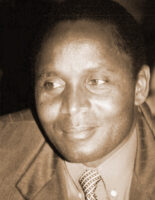Paul Kipkorir Marsin Sang was the MP for Bureti and Minister for Health shortly before the Opposition’s National Rainbow Coalition (NARC) dethroned the ruling party, KANU, from power. He had been a teacher before plugging into politics in 1997.
He mobilised grassroot support and defeated the late Jonathan Kimetet Ng’eno, who was a confidant of President Daniel arap Moi and a friend in the KANU party primaries. When Ng’eno was first elected in 1983, he worked as Minister for Basic Education and later, Minister for Public Works and Housing.
For Sang, it was a landslide win in what was then a KANU exclusive zone. At the time, Opposition parties had not made inroads into what was considered the independence party strongholds, fearing a backlash from KANU diehard supporters.
Born on 15 August 1952 in Bureti, Sang attended Koiwalelach Primary School and later joined Cheptenye Secondary School for his O’ levels. He proceeded to Shimo La Tewa High School in Mombasa before being admitted to Kenyatta University College between 1976 and 1979 for a Bachelor of Education (Science) degree. When he graduated, he was employed as a teacher in Kaplong Boys Secondary School in Bomet District (now Bomet County).
A year later he was promoted to deputy headmaster, a position he held for seven years. Those who worked with him say before he quit teaching in 1996 to join politics, he was a hard working teacher who was also good in management.
According to Sang, the President had a difficult time deciding who, between him and Ng’eno, should be cleared by the party to run for the Bureti seat. In those days, nominations in political party strongholds meant a direct ticket to Parliament.
“Ng’eno was Moi’s trusted lieutenant while I was a young promising leader with huge grassroot support. He hesitated for a while before reluctantly deciding that we should both go and face the electorate in the primaries. He promised to work with whoever would emerge victorious,” said Sang.
He earned a Kipsigis name, ‘Chemambuch’ (meaning ‘love me for free’ to insinuate that he did not have money to splash on the campaigns) and said Moi’s decision was well received by the people.
“Many thought he would stick with Ng’eno whom he had known for many years, even before I became a teacher. They were surprised when he sent both of us to the people.”
He said although he had no money, he made it because the people trusted him.
When he was appointed Minister for Health, he made public health a priority, ensuring that many health facilities, including dispensaries, were fully stocked with drugs.
“In Kapkatet in Kericho District, I ensured that a medical college was set up,” he said.
Sang takes pride in sticking with KANU during his political career, saying a principled leader should not jump ship for self benefit. In 2016, he vied for the Kericho senatorial seat but was beaten by Aaron Cheruiyot in a by-election occasioned by the appointment of Charles Keter to the Cabinet by President Uhuru Kenyatta. Although he lost again in the August 2017 General Election, he said he was not about to quit active politics.
“I will still offer myself for elective positions because I want to get people out of poverty and poor leadership,” he said. “If resources are well utilised, people can come out of poverty. There is a need for focused leadership.”
For Sang, a simple and down-to-earth man who interacts with all groups of people, politics is a calling.
“I was motivated to join politics to help lift people out of poverty. Poverty levels in Kericho and in Kenya at large are unacceptably high. Selfless leaders are needed,” he said, citing his role models as former US President Thomas Jefferson, African-American civil rights leader Martin Luther King Jr, Calcutta’s humble humanitarian, Mother Theresa, and South Africa’s iconic anti-apartheid activist, Nelson Mandela.
Sang was also chairman of the Nyayo Tea Zones for five years.
“I used the position to ensure that residents, the community and small-scale tea growers got value for their produce and good infrastructure like tarmac roads in tea-growing areas,” he said.
He will be remembered for saying, “Rain doesn’t come from trees; it comes from heaven,” in protest against a Government plan to kick squatters out of Mau Forest in efforts to restore its tree cover to beat climate change.
